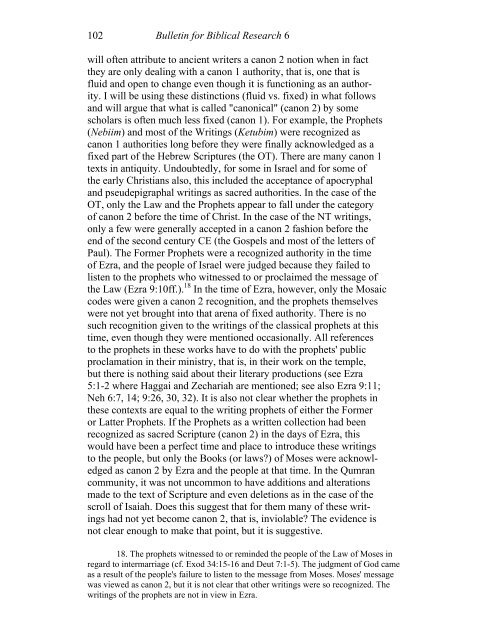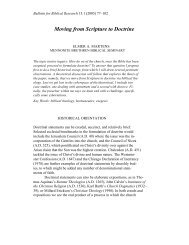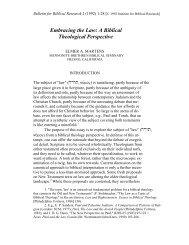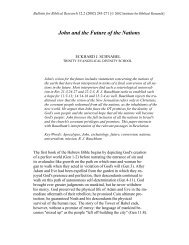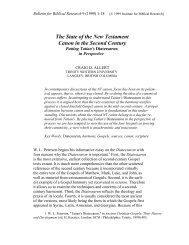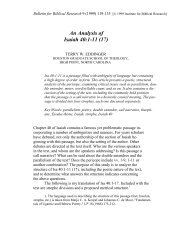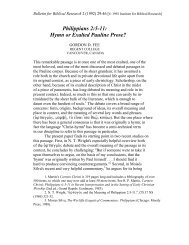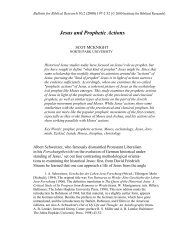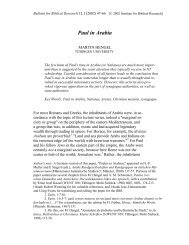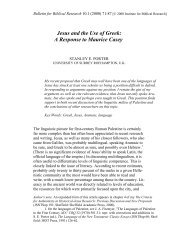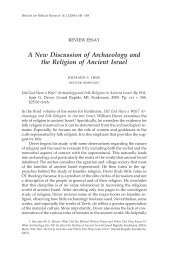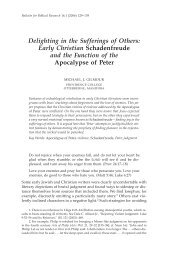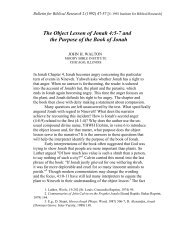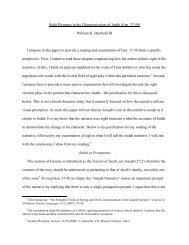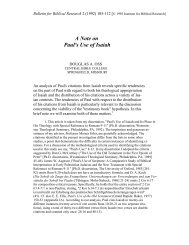The Integrity of the Biblical Canon in Light of Its Historical ...
The Integrity of the Biblical Canon in Light of Its Historical ...
The Integrity of the Biblical Canon in Light of Its Historical ...
Create successful ePaper yourself
Turn your PDF publications into a flip-book with our unique Google optimized e-Paper software.
102 Bullet<strong>in</strong> for <strong>Biblical</strong> Research 6<br />
will <strong>of</strong>ten attribute to ancient writers a canon 2 notion when <strong>in</strong> fact<br />
<strong>the</strong>y are only deal<strong>in</strong>g with a canon 1 authority, that is, one that is<br />
fluid and open to change even though it is function<strong>in</strong>g as an authority.<br />
I will be us<strong>in</strong>g <strong>the</strong>se dist<strong>in</strong>ctions (fluid vs. fixed) <strong>in</strong> what follows<br />
and will argue that what is called "canonical" (canon 2) by some<br />
scholars is <strong>of</strong>ten much less fixed (canon 1). For example, <strong>the</strong> Prophets<br />
(Nebiim) and most <strong>of</strong> <strong>the</strong> Writ<strong>in</strong>gs (Ketubim) were recognized as<br />
canon 1 authorities long before <strong>the</strong>y were f<strong>in</strong>ally acknowledged as a<br />
fixed part <strong>of</strong> <strong>the</strong> Hebrew Scriptures (<strong>the</strong> OT). <strong>The</strong>re are many canon 1<br />
texts <strong>in</strong> antiquity. Undoubtedly, for some <strong>in</strong> Israel and for some <strong>of</strong><br />
<strong>the</strong> early Christians also, this <strong>in</strong>cluded <strong>the</strong> acceptance <strong>of</strong> apocryphal<br />
and pseudepigraphal writ<strong>in</strong>gs as sacred authorities. In <strong>the</strong> case <strong>of</strong> <strong>the</strong><br />
OT, only <strong>the</strong> Law and <strong>the</strong> Prophets appear to fall under <strong>the</strong> category<br />
<strong>of</strong> canon 2 before <strong>the</strong> time <strong>of</strong> Christ. In <strong>the</strong> case <strong>of</strong> <strong>the</strong> NT writ<strong>in</strong>gs,<br />
only a few were generally accepted <strong>in</strong> a canon 2 fashion before <strong>the</strong><br />
end <strong>of</strong> <strong>the</strong> second century CE (<strong>the</strong> Gospels and most <strong>of</strong> <strong>the</strong> letters <strong>of</strong><br />
Paul). <strong>The</strong> Former Prophets were a recognized authority <strong>in</strong> <strong>the</strong> time<br />
<strong>of</strong> Ezra, and <strong>the</strong> people <strong>of</strong> Israel were judged because <strong>the</strong>y failed to<br />
listen to <strong>the</strong> prophets who witnessed to or proclaimed <strong>the</strong> message <strong>of</strong><br />
<strong>the</strong> Law (Ezra 9:10ff.). 18 In <strong>the</strong> time <strong>of</strong> Ezra, however, only <strong>the</strong> Mosaic<br />
codes were given a canon 2 recognition, and <strong>the</strong> prophets <strong>the</strong>mselves<br />
were not yet brought <strong>in</strong>to that arena <strong>of</strong> fixed authority. <strong>The</strong>re is no<br />
such recognition given to <strong>the</strong> writ<strong>in</strong>gs <strong>of</strong> <strong>the</strong> classical prophets at this<br />
time, even though <strong>the</strong>y were mentioned occasionally. All references<br />
to <strong>the</strong> prophets <strong>in</strong> <strong>the</strong>se works have to do with <strong>the</strong> prophets' public<br />
proclamation <strong>in</strong> <strong>the</strong>ir m<strong>in</strong>istry, that is, <strong>in</strong> <strong>the</strong>ir work on <strong>the</strong> temple,<br />
but <strong>the</strong>re is noth<strong>in</strong>g said about <strong>the</strong>ir literary productions (see Ezra<br />
5:1-2 where Haggai and Zechariah are mentioned; see also Ezra 9:11;<br />
Neh 6:7, 14; 9:26, 30, 32). It is also not clear whe<strong>the</strong>r <strong>the</strong> prophets <strong>in</strong><br />
<strong>the</strong>se contexts are equal to <strong>the</strong> writ<strong>in</strong>g prophets <strong>of</strong> ei<strong>the</strong>r <strong>the</strong> Former<br />
or Latter Prophets. If <strong>the</strong> Prophets as a written collection had been<br />
recognized as sacred Scripture (canon 2) <strong>in</strong> <strong>the</strong> days <strong>of</strong> Ezra, this<br />
would have been a perfect time and place to <strong>in</strong>troduce <strong>the</strong>se writ<strong>in</strong>gs<br />
to <strong>the</strong> people, but only <strong>the</strong> Books (or laws?) <strong>of</strong> Moses were acknowledged<br />
as canon 2 by Ezra and <strong>the</strong> people at that time. In <strong>the</strong> Qumran<br />
community, it was not uncommon to have additions and alterations<br />
made to <strong>the</strong> text <strong>of</strong> Scripture and even deletions as <strong>in</strong> <strong>the</strong> case <strong>of</strong> <strong>the</strong><br />
scroll <strong>of</strong> Isaiah. Does this suggest that for <strong>the</strong>m many <strong>of</strong> <strong>the</strong>se writ<strong>in</strong>gs<br />
had not yet become canon 2, that is, <strong>in</strong>violable? <strong>The</strong> evidence is<br />
not clear enough to make that po<strong>in</strong>t, but it is suggestive.<br />
18. <strong>The</strong> prophets witnessed to or rem<strong>in</strong>ded <strong>the</strong> people <strong>of</strong> <strong>the</strong> Law <strong>of</strong> Moses <strong>in</strong><br />
regard to <strong>in</strong>termarriage (cf. Exod 34:15-16 and Deut 7:1-5). <strong>The</strong> judgment <strong>of</strong> God came<br />
as a result <strong>of</strong> <strong>the</strong> people's failure to listen to <strong>the</strong> message from Moses. Moses' message<br />
was viewed as canon 2, but it is not clear that o<strong>the</strong>r writ<strong>in</strong>gs were so recognized. <strong>The</strong><br />
writ<strong>in</strong>gs <strong>of</strong> <strong>the</strong> prophets are not <strong>in</strong> view <strong>in</strong> Ezra.


